Museum Display Information
Abyssinian Campaign 1868
Please note that most of the objects shown here have been temporarily removed from display while we work on a project to research and reinterpret the cultural artefacts related to the Abyssinian campaign and address the colonial era legacy of the King's Own Royal Regiment. You can find out more about the project on our new visitor website: Abyssinia Project.
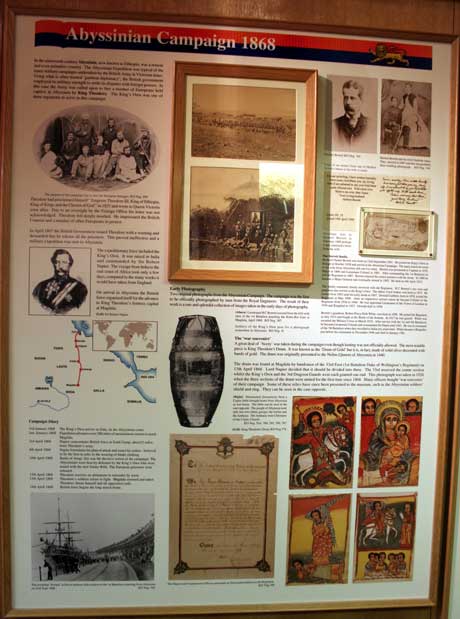
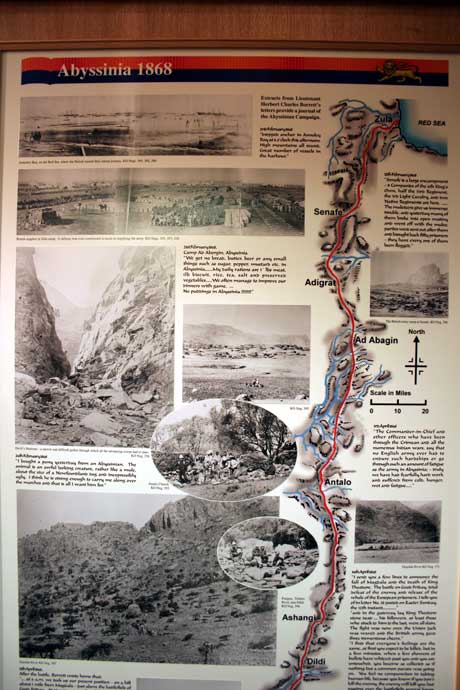
The Abyssinian Expedition was typical of the many military campaigns
undertaken by the British army in Victorian times. Often termed ‘gunboat
diplomacy’ the idea was that when there was a problem with a foreign
power force would be used to settle the matter. The King’s Own were one
of three Regiments to serve in the campaign against the very primitive
people of Abyssinia.
Abyssinia, now known as Ethiopia, was regarded as a remote place which
few people knew anything about. In 1868 the King's Own were called upon
to free a number of Europeans held captive there by King Theodore.
Theodore had proclaimed himself Emperor in 1855 and wrote to Queen
Victoria soon after. Due to an oversight by the Foreign Office the
letter was not acknowledged. Theodore felt deeply insulted. He
imprisoned the British Counsel and a number of other Europeans in
protest.
In April 1867 the British Government issued Theodore with a warning that
he should release all the prisoners. This proved ineffective. It was
decided that a military expedition would have to be sent to Abyssinia.
The expeditionary force, including the King's Own, was raised in India
and commanded by Sir Robert Napier. The voyage to the East coast of
Africa from India took only a few days, compared to the many weeks it
would have taken from England.
On arrival in Abyssinia the British force organised itself for the
advance to King Theodore's fortress capital at Magdala:
Campaign Diary
3rd January 1868 The King's Own arrive at Zoulla, on the coast.
late January 1868 Expedition advances over 380 miles of mountainous
terrain to reach Magdala.
3rd April 1868 Napier concentrates British force at Sindi Camp, about12
miles from Theodore's army.
8th April 1868 Napier formulates his plan of attack, and issues orders,
believed to be the first to refer to the wearing of khaki clothing.
10th April 1868 Battle of Arogie: this was the decisive action of the
campaign. The Abyssinians were heavily defeated by The King's Own armed
with the new Snider Rifle.
European prisoners released.
12th April 1868 Theodore receives an ultimatum to surrender by noon.
13th April 1868 Theodore's soldiers refuse to fight. Magdala stormed and
taken. Theodore shoots himself and all opposition ends.
19th April 1868 British force begin the long march home.
Letters of Lieutenant H C Borrett
Borrett wrote to his wife extensively throughout the campaign. His
letters cover many details of the British advance. The campaign is
described through his words:
to have "marched quickly 400 miles through an unknown country, dependent
entirely on ourselves for provisions, have routed an Abyssinian army in
one engagement - have (through God's blessing) released every European
Prisoner - have taken Magdala without a check - have dispersed the whole
of the enemy".
"Senafe is a large encampment - 8 Companies of the 4th King's Own, half
the 33rd Regiment, the 3rd Light Cavalry, and two Native Regiments are
here." "The muleteers give us immense trouble, and yesterday many of
them broke into open mutiny and went off with the mules; parties were
sent out after them and brought back fifty prisoners - they have every
one of them been flogged."
21st February 1868, Camp Ad Aborgin, Abyssinia
"We get no bread, butter, beer or any small things such as sugar,
pepper, mustard etc. in Abyssinia......My daily rations are 1½ lbs meat,
1lb biscuits, rice, sugar, tea, salt and preserved vegetables.....We
often manage to improve our dinners with game."
24th February 1868,
"I bought a pony yesterday from an Abyssinian. The animal is an awful
looking creature, rather like a mule, about the size of a Newfoundland
dog and inexpressibly ugly. I think he is strong enough to carry me
along over the marches and that is all I want him for. "
3rd April 1868
"The Commander-in-Chief and other officers who have been through the
Crimean and all the numerous Indian wars, say, that no English army ever
had to endure such hardships or go through such an amount of fatigue as
the army in Abyssinia; - truly we have had fearfully hard work and
suffered from cold, hunger, wet and fatigue....."
After the battle Borrett wrote home.....
"On Saturday 11th April at 4 a.m. we took up our present position - on a
hill about 1 mile from Magdala - just above the battle field of Good
Friday. At 10 a.m. we got breakfast and weren't we revenous! and at 11
a.m. I was sent out with a party of 30 men and some stretchers to search
for the enemy's wounded. It was an awful sight passing over the field of
yesterday, the ground was strewn with the slain, and in many places dead
bodies were piled one above the other. Muskets, swords, spears and
shields were lying all over the ground and horses were rushing about the
place, there were also many dead and wounded animals. The effect of our
snider rifles had been fearful, but I must not tell you of the awful,
ghastly and horrid sights we encountered in our search for the wounded;
we brought in all we could find and the poor fellows seemed very
grateful for the water we gave them."
14th April 1868
"I send you a few lines to announce the fall of Magdala and the death of
King Theodore. The battle on Good Friday, total defeat of the enemy and
release of the whole of the European prisoners, I told you of in letter
No. 18 posted on Easter Sunday, the 12th instant..........."
"and in the gateway lay King Theodore stone dead his followers, at least
those who stuck to him to the last, were all slain. The fight was now
over, the Union Jack was waved and the British army gave three
tremendous cheers."
"I find that everyone's feelings are the same, at first you expect to be
killed, but in a few minutes, when a few showers of bullets have whizzed
past you and you are untouched, you become as collected as if nothing
but a common parade was going on. You feel no compunction in taking
human life, because you know if you don't kill the enemy, the enemy will
kill you; but passing over the battlefield several hours after the
engagement and when you have sobered down, is indeed a fearful thing."
The Borrett family.
Herbert Charles Borrett was born on 23rd September 1841. He joined the
King’s Own as Ensign in October 1858 and served in the Abyssinia
Campaign. The many letters he wrote to his wife from Abyssinia still
survive today. Borrett was promoted to Captain in 1870, Major in 1880
and Lieutenant Colonel in 1881. After commanding the 1st Battalion he
left the Regiment in 1887. Borrett retained his senior position with the
Army. In 1889 he became a Major General and eventually retired in 1903.
He died on 4th April 1919.
The family remained closely involved with the Regiment. H C Borrett’s
two sons and grandson also served in the King’s Own. The eldest, Cecil
Arthur, was born in 1872. He served from 1892 until his early death in
1897. Oswald Cuthbert, born in 1878, joined the Regiment in May 1898.
After an impressive service career he became Colonel of the Regiment
from 1926 to 1944. He was appointed Lieutenant of the Tower of London in
1936 and Knighted in 1937. Oswald died in 1950.
Borrett’s grandson, Robert Percy Firth White, was born in 1896. He
joined the Regiment in July 1915 and fought at the Battle of the Somme.
In 1917 he was gassed. White was awarded the Military Cross in March
1918. After service with the 1st and 5th Battalions he became Lieutenant
Colonel and commanded the Depot until 1941. He was in command of the 7th
Battalion when they travelled to India two years later. White became a
Brigadier just before his retirement in November 1946 and died in
January 1981.
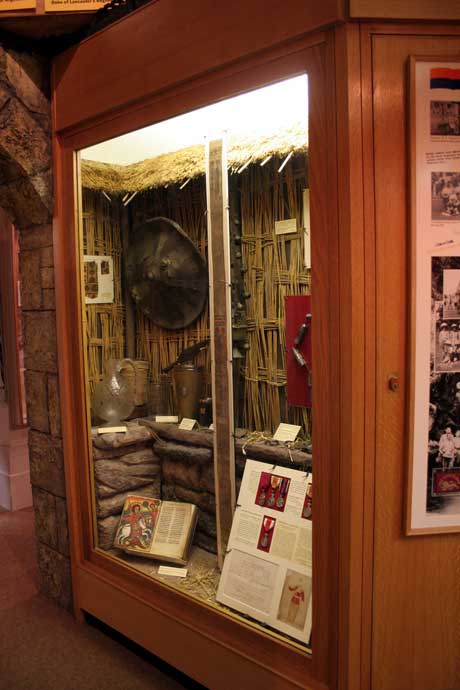
Objects:
Glass tumbler from King Theodore’s Palace at Magdala.
Accession Number: KO1411/01
Leather wallet containing bullets taken from one of the Abyssinian
soldiers.
Accession Number: KO0229/05
The King’s Own were issued with the new breech-loading Snider Rifle.
Previous rifles were loaded down the muzzle, breech loading was easier
and thus quicker. This example is similar to those used in Abyssinia.
Accession Number: KO1003/19
Horn beaker brought from Magdala by Lieutenant C M Davidson, 1868.
Accession Number: KO
Abyssinian ceremonial iron key given to Colonel Lugard by a priest at
Sir Robert Napier’s farewell conference with Abyssinian Chiefs, 1868.
Accession Number: KO0702/01 Bequeathed by Colonel Lugard
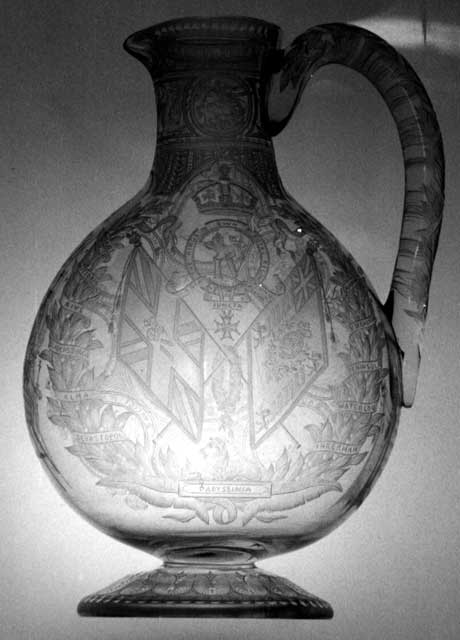
Apsley Pellatt cup designed and engraved for
the officers’ mess after the Abyssinian Campaign by Pellatt & Co., 1869. "Nine medallions depicting the views of Magdala (Abyssinia). It
is said to have taken a year to cut, and was at one time insured for
£2,000." - Colonel L I Cowper, Volume Two, The King's Own The
Story of a Royal Regiment.
Accession Number: KO0199/01
Abyssinian whip
Accession Number: KO0229/03
Abyssinian fly whirl
Accession Number: KO0229/04
Parts of a silver cross taken from Magdala Church, Abyssinia, after the
defeat of Emperor Theodore.
Accession Number: KO0229/09&10

Ring taken from a dead Abyssinian soldier by Lieutenant Borrett.
Accession Number: KO0467/04

Abyssinian women’s bracelets
KO0229/12&13

Abyssinian soldier’s shield
Accession Number: KO1477/001

Spear head
Accession Number: KO0229/18
Leather corn bag
Accession Number: KO0229/19

Coptic parchment strip of St. Mark’s Gospel.
Accession Number: KO0327/01A
Iron manacle removed from an English missionary held captive in Magdala
by Major E W Bray in 1868.
Accession Number: KO0327/03
Two pieces of cloth from the tent of King Theodore.
Accession Number: KO0327/02A-02B

Coptic manuscript, brought back from Abyssinia by General Sir E R P
Woodgate.
Accession Number: KO LIB 136/2
Impression of King Theodore’s state seal
Accession Number: KO0229/16
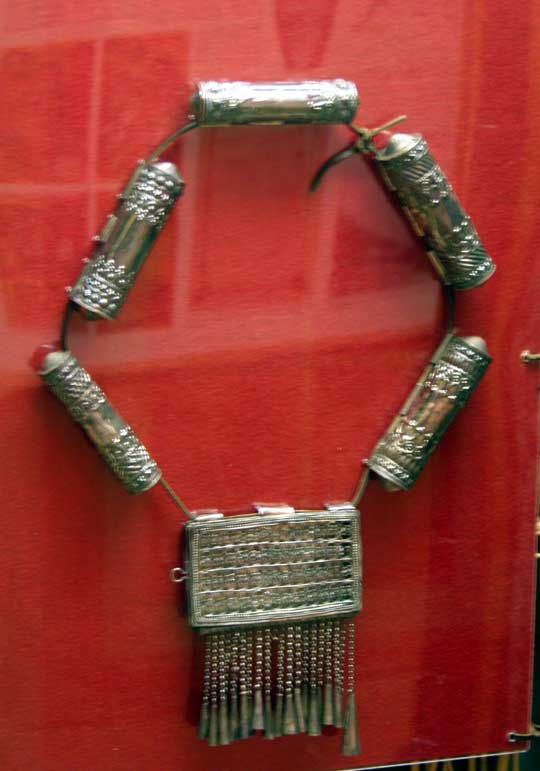
Silver ornamental necklace
Accession Number: KO0229/07
Part of handkerchief taken from the body of King Theodore after he
killed himself - stained with his blood.
Accession Number: KO0229/15

Horn tumbler
Accession Number: KO0776/02
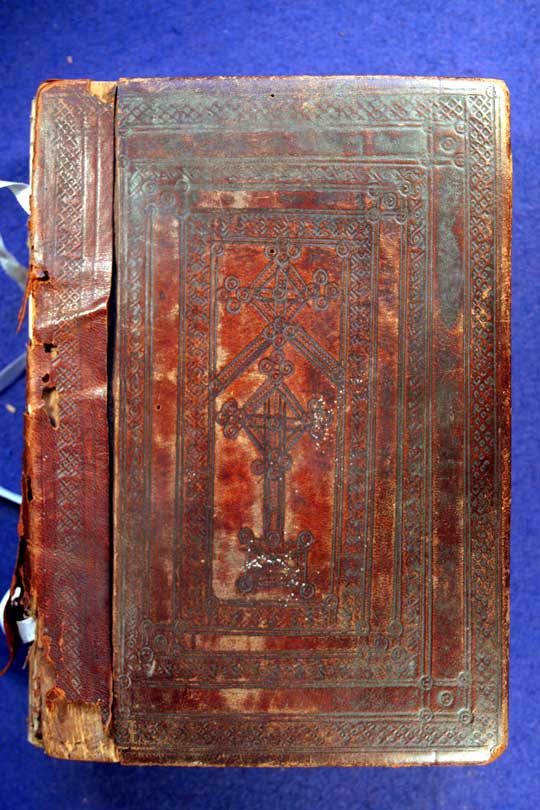
Bible of the Coptic Church
Accession Number: KOLIB0066

18th Century European glass tumbler, with storage basket.
Accession Number: KO0229/14
Medals:
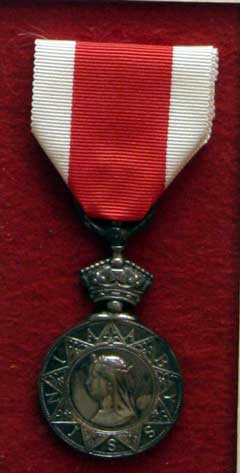
Abyssinian Medal to Drum Major William James Thompson
On his death his medals were divided amongst his children. Thompson’s
group included the Crimea, Turkish Crimea, Abyssinian and Long Service
and Good Conduct Medal from his time with the King’s Own, and a
Volunteer Long Service Medal from his time with the North Staffordshire
Volunteers.
His three sons all served in the King’s Own.
Accession Number: KO1017/172
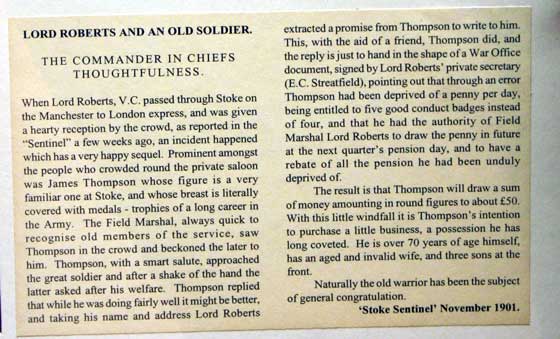
From ‘Stoke Sentinel’ November 1901.
Particulars of service. (no accession number).
Drum Major Thompson.
KO Neg. 837.
Each Abyssinian Medal was embossed with the number, name and regiment
of the recipient. The position of the details varied as can been seen in
these two examples.
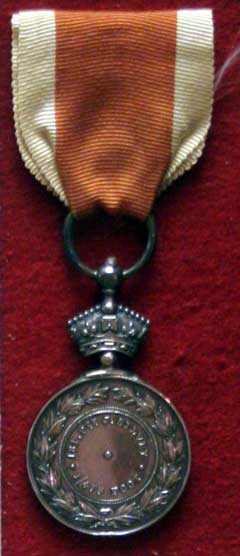
Abyssinian Medal (reverse) to Private J Silvey.
Accession Number: KO0224/05
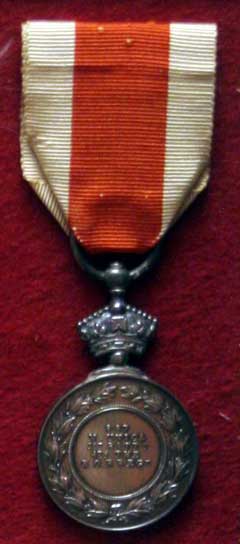
Abyssinian Medal (reverse) to Private M Unica.
Accession Number: KO0792/10
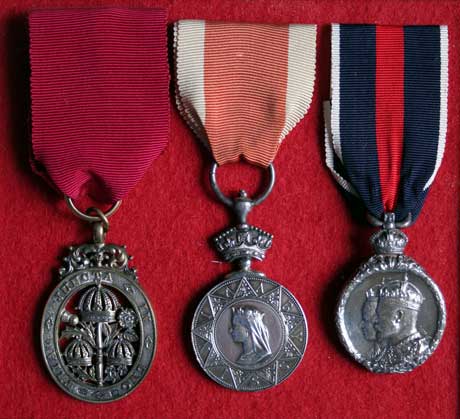
CB, Abyssinian Medal and 1911 Coronation Medal to Major General Herbert
Cuthbert Borrett, King's Own Royal Regiment.
Accession Numbers: KO0687/01-02-03
© Images are copyright, Trustees of the King's Own Royal Regiment Museum.
You must seek permission prior to
publication of any of our images.
Only a proportion of our collections
are on display at anyone time. Certain items are on loan for display
in other institutions. An appointment is required to consult any of
our collections which are held in store.




















